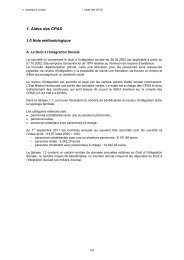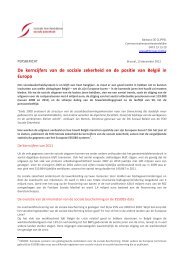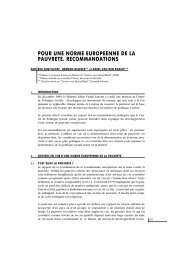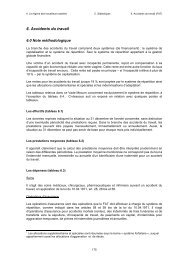- Page 1 and 2:
4 4e trimester 2006 48e jaargang 4
- Page 3 and 4:
DE STAAT VAN DE VERZORGINGSSTAAT IN
- Page 5 and 6:
DE STAAT VAN DE VERZORGINGSSTAAT IN
- Page 7 and 8:
DE STAAT VAN DE VERZORGINGSSTAAT IN
- Page 9 and 10:
DE STAAT VAN DE VERZORGINGSSTAAT IN
- Page 11 and 12:
DE STAAT VAN DE VERZORGINGSSTAAT IN
- Page 13 and 14:
DE STAAT VAN DE VERZORGINGSSTAAT IN
- Page 15 and 16:
DEEL 1: DE EUROPESE VERZORGINGSSTAT
- Page 17 and 18:
BELGISCH TIJDSCHRIFT VOOR SOCIALE Z
- Page 19 and 20:
BELGISCH TIJDSCHRIFT VOOR SOCIALE Z
- Page 21 and 22:
BELGISCH TIJDSCHRIFT VOOR SOCIALE Z
- Page 23 and 24:
BELGISCH TIJDSCHRIFT VOOR SOCIALE Z
- Page 25 and 26:
BELGISCH TIJDSCHRIFT VOOR SOCIALE Z
- Page 27 and 28:
BELGISCH TIJDSCHRIFT VOOR SOCIALE Z
- Page 29 and 30:
BELGISCH TIJDSCHRIFT VOOR SOCIALE Z
- Page 31 and 32:
BELGISCH TIJDSCHRIFT VOOR SOCIALE Z
- Page 33 and 34:
BELGISCH TIJDSCHRIFT VOOR SOCIALE Z
- Page 35 and 36:
BELGISCH TIJDSCHRIFT VOOR SOCIALE Z
- Page 37 and 38:
BELGISCH TIJDSCHRIFT VOOR SOCIALE Z
- Page 39 and 40:
BELGISCH TIJDSCHRIFT VOOR SOCIALE Z
- Page 41 and 42:
BELGISCH TIJDSCHRIFT VOOR SOCIALE Z
- Page 43 and 44:
BELGISCH TIJDSCHRIFT VOOR SOCIALE Z
- Page 45 and 46:
BELGISCH TIJDSCHRIFT VOOR SOCIALE Z
- Page 47 and 48:
BELGISCH TIJDSCHRIFT VOOR SOCIALE Z
- Page 49 and 50:
BELGISCH TIJDSCHRIFT VOOR SOCIALE Z
- Page 51 and 52:
BELGISCH TIJDSCHRIFT VOOR SOCIALE Z
- Page 53 and 54:
BELGISCH TIJDSCHRIFT VOOR SOCIALE Z
- Page 55 and 56:
BELGISCH TIJDSCHRIFT VOOR SOCIALE Z
- Page 57 and 58:
BELGISCH TIJDSCHRIFT VOOR SOCIALE Z
- Page 59 and 60:
BELGISCH TIJDSCHRIFT VOOR SOCIALE Z
- Page 61 and 62:
BELGISCH TIJDSCHRIFT VOOR SOCIALE Z
- Page 63 and 64:
BELGISCH TIJDSCHRIFT VOOR SOCIALE Z
- Page 65 and 66:
BELGISCH TIJDSCHRIFT VOOR SOCIALE Z
- Page 67 and 68:
BELGISCH TIJDSCHRIFT VOOR SOCIALE Z
- Page 69 and 70:
BELGISCH TIJDSCHRIFT VOOR SOCIALE Z
- Page 71 and 72:
BELGISCH TIJDSCHRIFT VOOR SOCIALE Z
- Page 73 and 74:
BELGISCH TIJDSCHRIFT VOOR SOCIALE Z
- Page 75 and 76:
BELGISCH TIJDSCHRIFT VOOR SOCIALE Z
- Page 77 and 78:
BELGISCH TIJDSCHRIFT VOOR SOCIALE Z
- Page 79 and 80:
BELGISCH TIJDSCHRIFT VOOR SOCIALE Z
- Page 81 and 82:
DE SOCIALE KWALITEIT VAN EUROPA BEH
- Page 83 and 84:
DE SOCIALE KWALITEIT VAN EUROPA BEH
- Page 85 and 86:
DE SOCIALE KWALITEIT VAN EUROPA BEH
- Page 87 and 88:
BEHOUD VAN EEN SOCIAAL EUROPA DOOR
- Page 89 and 90:
BEHOUD VAN EEN SOCIAAL EUROPA ... T
- Page 91 and 92:
BEHOUD VAN EEN SOCIAAL EUROPA ... E
- Page 93 and 94:
BEHOUD VAN EEN SOCIAAL EUROPA ... H
- Page 95 and 96:
BEHOUD VAN EEN SOCIAAL EUROPA ... I
- Page 97 and 98:
BELGISCH TIJDSCHRIFT VOOR SOCIALE Z
- Page 99 and 100:
BELGISCH TIJDSCHRIFT VOOR SOCIALE Z
- Page 101 and 102:
BELGISCH TIJDSCHRIFT VOOR SOCIALE Z
- Page 103 and 104:
BELGISCH TIJDSCHRIFT VOOR SOCIALE Z
- Page 105 and 106:
DEEL 2: HET FRAAIE GELAAT VAN DE BE
- Page 107 and 108:
BELGISCH TIJDSCHRIFT VOOR SOCIALE Z
- Page 109 and 110:
BELGISCH TIJDSCHRIFT VOOR SOCIALE Z
- Page 111 and 112:
BELGISCH TIJDSCHRIFT VOOR SOCIALE Z
- Page 113 and 114:
BELGISCH TIJDSCHRIFT VOOR SOCIALE Z
- Page 115 and 116:
BELGISCH TIJDSCHRIFT VOOR SOCIALE Z
- Page 117 and 118:
BELGISCH TIJDSCHRIFT VOOR SOCIALE Z
- Page 119 and 120:
BELGISCH TIJDSCHRIFT VOOR SOCIALE Z
- Page 121 and 122:
BELGISCH TIJDSCHRIFT VOOR SOCIALE Z
- Page 123 and 124:
BELGISCH TIJDSCHRIFT VOOR SOCIALE Z
- Page 125 and 126:
BELGISCH TIJDSCHRIFT VOOR SOCIALE Z
- Page 127 and 128:
BELGISCH TIJDSCHRIFT VOOR SOCIALE Z
- Page 129 and 130:
BELGISCH TIJDSCHRIFT VOOR SOCIALE Z
- Page 131 and 132:
BELGISCH TIJDSCHRIFT VOOR SOCIALE Z
- Page 133 and 134:
BELGISCH TIJDSCHRIFT VOOR SOCIALE Z
- Page 135 and 136:
BELGISCH TIJDSCHRIFT VOOR SOCIALE Z
- Page 137 and 138:
BELGISCH TIJDSCHRIFT VOOR SOCIALE Z
- Page 139 and 140:
DE STILLE NEERGANG VAN HET PENSIOEN
- Page 141 and 142:
DE STILLE NEERGANG VAN HET PENSIOEN
- Page 143 and 144:
DE STILLE NEERGANG VAN HET PENSIOEN
- Page 145 and 146:
DE STILLE NEERGANG VAN HET PENSIOEN
- Page 147 and 148:
DE STILLE NEERGANG VAN HET PENSIOEN
- Page 149 and 150:
BELGISCH TIJDSCHRIFT VOOR SOCIALE Z
- Page 151 and 152:
BELGISCH TIJDSCHRIFT VOOR SOCIALE Z
- Page 153 and 154:
BELGISCH TIJDSCHRIFT VOOR SOCIALE Z
- Page 155 and 156:
BELGISCH TIJDSCHRIFT VOOR SOCIALE Z
- Page 157 and 158:
BELGISCH TIJDSCHRIFT VOOR SOCIALE Z
- Page 159 and 160:
BELGISCH TIJDSCHRIFT VOOR SOCIALE Z
- Page 161 and 162:
BELGISCH TIJDSCHRIFT VOOR SOCIALE Z
- Page 163 and 164:
BELGISCH TIJDSCHRIFT VOOR SOCIALE Z
- Page 165 and 166:
BELGISCH TIJDSCHRIFT VOOR SOCIALE Z
- Page 167 and 168:
BELGISCH TIJDSCHRIFT VOOR SOCIALE Z
- Page 169 and 170:
BELGISCH TIJDSCHRIFT VOOR SOCIALE Z
- Page 171 and 172:
BELGISCH TIJDSCHRIFT VOOR SOCIALE Z
- Page 173 and 174:
BELGISCH TIJDSCHRIFT VOOR SOCIALE Z
- Page 175 and 176:
BELGISCH TIJDSCHRIFT VOOR SOCIALE Z
- Page 177 and 178:
BELGISCH TIJDSCHRIFT VOOR SOCIALE Z
- Page 179 and 180:
BELGISCH TIJDSCHRIFT VOOR SOCIALE Z
- Page 181 and 182:
BELGISCH TIJDSCHRIFT VOOR SOCIALE Z
- Page 183 and 184:
BELGISCH TIJDSCHRIFT VOOR SOCIALE Z
- Page 185 and 186:
BELGISCH TIJDSCHRIFT VOOR SOCIALE Z
- Page 187 and 188:
BELGISCH TIJDSCHRIFT VOOR SOCIALE Z
- Page 189 and 190:
BELGISCH TIJDSCHRIFT VOOR SOCIALE Z
- Page 191 and 192:
BELGISCH TIJDSCHRIFT VOOR SOCIALE Z
- Page 193 and 194:
BELGISCH TIJDSCHRIFT VOOR SOCIALE Z
- Page 195 and 196:
BELGISCH TIJDSCHRIFT VOOR SOCIALE Z
- Page 197 and 198:
BELGISCH TIJDSCHRIFT VOOR SOCIALE Z
- Page 199 and 200:
BELGISCH TIJDSCHRIFT VOOR SOCIALE Z
- Page 201 and 202:
BELGISCH TIJDSCHRIFT VOOR SOCIALE Z
- Page 203 and 204:
BELGISCH TIJDSCHRIFT VOOR SOCIALE Z
- Page 205 and 206:
BELGISCH TIJDSCHRIFT VOOR SOCIALE Z
- Page 207 and 208:
BELGISCH TIJDSCHRIFT VOOR SOCIALE Z
- Page 209 and 210:
BELGISCH TIJDSCHRIFT VOOR SOCIALE Z
- Page 211 and 212:
BELGISCH TIJDSCHRIFT VOOR SOCIALE Z
- Page 213 and 214:
BELGISCH TIJDSCHRIFT VOOR SOCIALE Z
- Page 215 and 216:
BELGISCH TIJDSCHRIFT VOOR SOCIALE Z
- Page 217 and 218:
BELGISCH TIJDSCHRIFT VOOR SOCIALE Z
- Page 219 and 220:
BELGISCH TIJDSCHRIFT VOOR SOCIALE Z
- Page 221 and 222:
BELGISCH TIJDSCHRIFT VOOR SOCIALE Z
- Page 223 and 224:
BELGISCH TIJDSCHRIFT VOOR SOCIALE Z
- Page 225 and 226:
BELGISCH TIJDSCHRIFT VOOR SOCIALE Z
- Page 227 and 228:
BELGISCH TIJDSCHRIFT VOOR SOCIALE Z
- Page 229 and 230:
BELGISCH TIJDSCHRIFT VOOR SOCIALE Z
- Page 231 and 232:
DE STAAT VAN DE VERZORGINGSSTAAT IN
- Page 233 and 234:
DE STAAT VAN DE VERZORGINGSSTAAT IN
- Page 235 and 236:
DE STAAT VAN DE VERZORGINGSSTAAT IN
- Page 237 and 238:
DE STAAT VAN DE VERZORGINGSSTAAT IN
- Page 239 and 240:
DE STAAT VAN DE VERZORGINGSSTAAT IN
- Page 241 and 242:
DE STAAT VAN DE VERZORGINGSSTAAT IN
- Page 243 and 244:
DE STAAT VAN DE VERZORGINGSSTAAT IN
- Page 245 and 246:
DE STAAT VAN DE VERZORGINGSSTAAT IN
- Page 247 and 248:
DE STAAT VAN DE VERZORGINGSSTAAT IN
- Page 249 and 250:
DE STAAT VAN DE VERZORGINGSSTAAT IN
- Page 251 and 252:
DE STAAT VAN DE VERZORGINGSSTAAT IN
- Page 253 and 254:
DE STAAT VAN DE VERZORGINGSSTAAT IN
- Page 255 and 256:
DE STAAT VAN DE VERZORGINGSSTAAT IN
- Page 257 and 258:
DE TOESTAND VAN DE VERZORGINGSSTAAT
- Page 259 and 260:
DE TOESTAND VAN DE VERZORGINGSSTAAT
- Page 261 and 262:
DE TOESTAND VAN DE VERZORGINGSSTAAT
- Page 263 and 264:
DE TOESTAND VAN DE VERZORGINGSSTAAT
- Page 265 and 266:
DE TOESTAND VAN DE VERZORGINGSSTAAT
- Page 267 and 268:
DE TOESTAND VAN DE VERZORGINGSSTAAT
- Page 269 and 270:
DE TOESTAND VAN DE VERZORGINGSSTAAT
- Page 271 and 272:
DE TOESTAND VAN DE VERZORGINGSSTAAT
- Page 273 and 274:
DE TOESTAND VAN DE VERZORGINGSSTAAT
- Page 275 and 276:
DE TOESTAND VAN DE VERZORGINGSSTAAT
- Page 277 and 278:
DE TOESTAND VAN DE VERZORGINGSSTAAT
- Page 279 and 280:
DE TOESTAND VAN DE VERZORGINGSSTAAT
- Page 281 and 282:
DE TOESTAND VAN DE VERZORGINGSSTAAT
- Page 283 and 284: DE TOESTAND VAN DE VERZORGINGSSTAAT
- Page 285 and 286: BELGISCH TIJDSCHRIFT VOOR SOCIALE Z
- Page 287 and 288: BELGISCH TIJDSCHRIFT VOOR SOCIALE Z
- Page 289 and 290: BELGISCH TIJDSCHRIFT VOOR SOCIALE Z
- Page 291 and 292: BELGISCH TIJDSCHRIFT VOOR SOCIALE Z
- Page 293 and 294: BELGISCH TIJDSCHRIFT VOOR SOCIALE Z
- Page 295 and 296: BELGISCH TIJDSCHRIFT VOOR SOCIALE Z
- Page 297 and 298: BELGISCH TIJDSCHRIFT VOOR SOCIALE Z
- Page 299 and 300: BELGISCH TIJDSCHRIFT VOOR SOCIALE Z
- Page 301 and 302: BELGISCH TIJDSCHRIFT VOOR SOCIALE Z
- Page 303 and 304: BELGISCH TIJDSCHRIFT VOOR SOCIALE Z
- Page 305 and 306: BELGISCH TIJDSCHRIFT VOOR SOCIALE Z
- Page 307 and 308: BELGISCH TIJDSCHRIFT VOOR SOCIALE Z
- Page 309 and 310: BELGISCH TIJDSCHRIFT VOOR SOCIALE Z
- Page 311 and 312: BELGISCH TIJDSCHRIFT VOOR SOCIALE Z
- Page 313 and 314: BELGISCH TIJDSCHRIFT VOOR SOCIALE Z
- Page 315 and 316: BELGISCH TIJDSCHRIFT VOOR SOCIALE Z
- Page 317 and 318: BELGISCH TIJDSCHRIFT VOOR SOCIALE Z
- Page 319 and 320: BELGISCH TIJDSCHRIFT VOOR SOCIALE Z
- Page 321 and 322: BELGISCH TIJDSCHRIFT VOOR SOCIALE Z
- Page 323 and 324: BELGISCH TIJDSCHRIFT VOOR SOCIALE Z
- Page 325 and 326: BELGISCH TIJDSCHRIFT VOOR SOCIALE Z
- Page 327 and 328: BELGISCH TIJDSCHRIFT VOOR SOCIALE Z
- Page 329 and 330: BELGISCH TIJDSCHRIFT VOOR SOCIALE Z
- Page 331 and 332: BELGISCH TIJDSCHRIFT VOOR SOCIALE Z
- Page 333: ABSTRACTS ABSTRACTS “De staat van
- Page 337 and 338: ABSTRACTS “Maintaining a social E
- Page 339 and 340: ABSTRACTS financing base, while the
- Page 341 and 342: ABSTRACTS more competition and priv
- Page 343 and 344: ABSTRACTS “De staat van de verzor
- Page 345 and 346: ABSTRACTS “De verzorgingsstaat in
- Page 347 and 348: PRIJS Per nummer Voor België .....

















